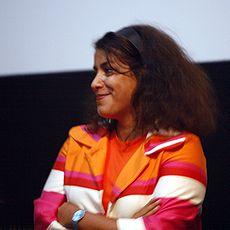Marjane Satrapi (Author/Illustrator/Director)
 Marjane Satrapi (born 22 November 1969 in Rasht, Iran) is an Iranian-born French contemporary graphic novelist, illustrator, animated film director, and children's book author.
Marjane Satrapi (born 22 November 1969 in Rasht, Iran) is an Iranian-born French contemporary graphic novelist, illustrator, animated film director, and children's book author.
Satrapi grew up in Tehran in a family which was involved with communist and socialist movements in Iran prior to the Iranian Revolution.
Satrapi grew up in Tehran in a family which was involved with communist and socialist movements in Iran prior to the Iranian Revolution.
She attended the Lycée Français there and witnessed, as a child, the growing suppression of civil liberties and the everyday-life consequences of Iranian politics, including the fall of the Shah, the early regime of Ruhollah Khomeini, and the first years of the Iran-Iraq war.
Satrapi's family are of distant Iranian Azeri ancestry and are descendants of Nasser al-Din Shah, Shah of Persia from 1848 until 1896. Satrapi said that "But you have to know the kings of the Qajar dynasty, they had hundreds of wives.
Here's the trailer for her multi-award winning auto-biographical cartoon movie Persepolis:
They made thousands of kids. If you multiply these kids by generation you have, I don't know, 10-15,000 princes [and princesses]. There's nothing extremely special about that." She added that due to this detail, most Iranian families would be, in the words of Simon Hattenstone of The Guardian, "blue blooded."
In 1983, at the age of 14 Satrapi was sent to Vienna, Austria by her parents in order to flee the Iranian regime. There she attended the Lycée Français de Vienne. According to her autobiographical graphic novel, Persepolis, she stayed in Vienna through her high school years, staying in friends' homes, but eventually became homeless.
After an almost deadly bout of pneumonia, she returned to Iran. She went to university in Iran and met a man named Reza, whom she married at age 21 and divorced roughly three years later.
She then studied Visual Communication, eventually obtaining a Master's Degree in Visual Communication from the School of Fine Arts in Tehran, Islamic Azad University. Satrapi then moved to Strasbourg, France. She currently lives in Paris, where she works as an illustrator and an author of children's books.
Satrapi's career began in earnest when she met David B., a French comics artist. She adopted a style similar to his, especially in her earliest works. Satrapi became famous worldwide because of her critically acclaimed autobiographical graphic novels, originally published in French in four parts in 2000–2003 and in English translation in two parts in 2003 and 2004, respectively, as Persepolis and Persepolis 2, which describe her childhood in Iran and her adolescence in Europe.
Persepolis won the Angoulême Coup de Coeur Award at the Angoulême International Comics Festival. Her later publication, Embroideries (Broderies) was also nominated for the Angoulême Album of the Year award in 2003, an award which was won by her most recent novel, Chicken with Plums (Poulet aux prunes). She has also contributed to the Op-Ed section of The New York Times.
Persepolis was adapted into an animated film of the same name, which debuted at the 2007 Cannes Film Festival in May 2007 and shared a Special Jury Prize with Silent Light (Luz silenciosa) by Carlos Reygadas. Co-written and co-directed by Satrapi and Vincent Paronnaud, the French-language picture stars the voices of Chiara Mastroianni, Catherine Deneuve, Danielle Darrieux, and Simon Abkarian.
The English version, starring the voices of Gena Rowlands, Sean Penn, and Iggy Pop, was nominated for an Academy Award for Best Animated Feature in January 2008. She and director Vincent Paronnaud are currently teaming together again for a live-action adaptation of her graphic novel "Chicken With Plums."
Following the Iranian elections in June 2009, Marjane Satrapi and Iranian filmmaker Mohsen Makhmalbaf appeared before Green Party members in the European Parliament to present a document allegedly received from a member of the Iranian electoral commission claiming that the reform candidate Mir Hossein Mousavi had actually won the election, and that the conservative incumbent Mahmoud Ahmedinejad had received only 12% of the vote.
Related Articles
- Delaram Ali (Iranian Women's Rights Activist)
- Iranian "Lionesses" In The Streets of Tehran
- Iranian Women At Forefront Of Demonstrations
- 53 Iranian Americans Speak For Peace
- Persepolis Stands For Lack Of A Permit: A Heroic Story From 1979 Post-Revolutionary Iran
- Listen Up Government of Iran: My Mom Has A Message For You!
- Iranian Skier Realises Dream: Participating In Winter Olympic Games
- Iran Women Rights Defenders Continue Undeterred by Prison Detention
- Insanity Strikes Iranian Cleric
- Shirin Ebadi: Iranian Women At Green Helm
- Parisa Hafezi Reports From Iran